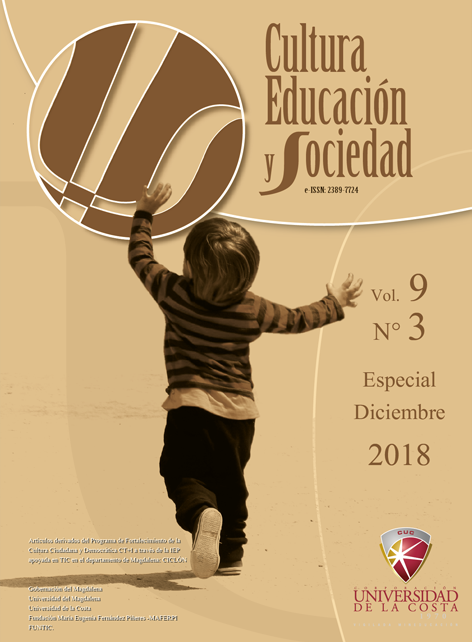Research as a pedagogical strategy for recycling in the Rural IED Guillermo Álvarez
DOI:
https://doi.org/10.17981/cultedusoc.9.3.2018.60Keywords:
Education, research, recycling, environment, garbageAbstract
Research for many people is considered boring and tedious, due to the complexity of the topics studied. But it is a process that helps to develop research skills both in the environmental and environmental field, when looking for alternatives with reflective, critical and exploratory thinking about the environmental phenomena that happen in their daily lives. At the global level, both in Latin America and the Caribbean, the handling of garbage and its subsequent use are a problem that affects everyone. This article presents how research can be used as a pedagogical strategy (IEP) for recycling. It was focused under the qualitative approach, from the type of action research. The population of this study was constituted by fifty (50) sixth grade students of the IED Rural Guillermo Álvarez Baccalaureate. Giving as results the accomplishment of pedagogical activities with which the conceptions and habits of the students with respect to the recycling inside the institution were identified. Arriving at the respective conclusions of the need to Recycle, Reuse and Reduce the garbage generated by the institution.
Downloads
References
Cetrulo, R. (2001). Alternativas para una acción transformadora: Educación popular, ciencias y política. Montevideo: Trilce-Instituto del Hombre.
Girardet, H. (2001). Creando ciudades sostenibles. Valencia: Tilde.
Herrera-Tapias, B. (2013). La constitucionalizarían de los derechos del consumidor en Colombia: un análisis desde los derechos sociales fundamentales. REVISTA CIVILIZAR CIENCIAS SOCIALES Y HUMANAS. Número 25. Volumen 13. ISSN 1657-8953. Julio – diciembre 2013. Pág. 33-48. Enlace: http://www.usergioarboleda.edu.co/civilizar/civilizar25/09%20LA%20CONSTITUCIONALIZACI%C3%93N.pdf
Maculan, A.-M., Jiménez , C., & Castellanos, O. (2015). Aprendizaje en el proceso de incubación de empresas de base tecnológica. Económicas CUC, 36(1), 15-48.
Medina, M. (1999). Reciclaje de desechos sólidos en América Latina. Frontera Norte. 11(21). 7-31. DOI: http://dx.doi.org/10.17428/rfn.v11i21.1411
Mejía, M. R. (2011). Las escuelas de la globalización. El conflicto por su reconfiguración. Bogotá, D.C.: Desde Abajo.
Mejía, M. R. y Manjarrés M. H. (2010). Las pedagogías fundadas en la investigación. Búsquedas en la reconfiguración de la educación. +Revista Internacional Magisterio. 42(1). 16-26.
Mendoza, D. L., & López, D. D. (2015). Pensamiento estratégico: centro neurálgico de la planificación estratégica que transforma la visión en acción. Económicas CUC, 36(1), 153-179.
Ortega, P. P. (2009). Sujetos y prácticas de la pedagogía crítica. Bogotá, D.C.: El Búho.
Pacheco, C. M. (2013). Estrategias empresariales más utilizadas por las pymes en Sincelejo. Económicas CUC, 34(1), 183-202.
Porlán, R. S. (1995). Constructivismo y escuela: hacia un modelo de enseñanza aprendizaje basado en la investigación. Sevilla: Diada.
Pozo, J. y. (2006). Aprender y enseñar ciencia. Madrid: Morata.
Ramírez-Molina, R. (2018). La Investigación como Estrategia Pedagogica en las Instituciones Educativas de Macondo. Barranquilla: Ciclón.
Ramírez-Molina, R. (2018b). El manejo de los Recursos sólidos para la creación de ambientes óptimos de aprendizaje en las Instituciones de Educación Departamental. Barranquilla: Ciclón.
República de Colombia. Ministerio de Educación. (2002). "Por el cual se reglamenta la Ley 142 de 1994, la Ley 632 de 2000 y la Ley 689 de 2001, en relación con la prestación del servicio público de aseo, y el Decreto Ley 2811 de 1974 y la Ley 99 de 1993 en relación con la Gestión Integral de Residuos Sólidos". [Decreto 1713]. D.O.: 44893. Recuperado de http://www.alcaldiabogota.gov.co/sisjur/normas/Norma1.jsp?i=5542
Vilches, A. y Gil, D. (2007). Emergencia planetaria: Necesidad de un planteamiento global. Educatio Siglo XXI, 25 (1). pp. 19-49.
Downloads
Published
How to Cite
Issue
Section
License
Copyright (c) 2018 CULTURA EDUCACIÓN Y SOCIEDAD

This work is licensed under a Creative Commons Attribution-NonCommercial-NoDerivatives 4.0 International License.
![]()
Creative Commons 2020 CULTURA EDUCACIÓN Y SOCIEDAD
This article is under international license Creative Commons Reconocimiento-NoComercial-SinObrasDerivadas 4.0.
The published articles are the sole responsibility of their authors and do not necessarily reflect the opinions of the editorial committee.
CULTURA EDUCACIÓN Y SOCIEDAD respects the moral rights of its authors, who assign to the editorial committee the patrimonial rights of the published material. In turn, the authors inform that this work is unpublished and has not been previously published.
All articles are under a:
Licencia Creative Commons Atribución-NoComercial-SinDerivadas 4.0 Internacional.
![]()


 English
English
 Español (España)
Español (España)




_12.53_.27_p_. m_._3.png)





_12.57_.35_p_. m_._3.png)
_12.50_.37_p_. m_._3.png)



